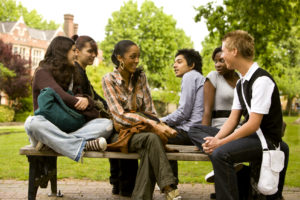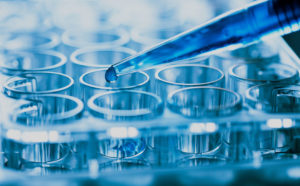A summer training program aims to help high school teachers relate science and religion in their classrooms

In 2009, Chris Baglow published a textbook entitled Faith, Science & Reason: Theology on the Cutting Edge that aimed to help Catholic educators to address challenging questions on science and faith in the classroom. Baglow, who received his Ph.D. in systematic theology in 2000 from Duquesne University, is currently a professor of theology at Notre Dame Seminary in New Orleans, La., and has spent many years exploring the relationship between faith and science. For Catholic high school teachers, however, bridging the divide between science and religion in the classroom is often a tricky task.
After the book was used for the first time in classes at McGill-Toolen Catholic High School in Mobile, Ala., Baglow realized that something more than a textbook would be needed. “The course made it clear to me that if teachers were going to be able to relate science and religion in a positive way — a way that doesn’t put the two in competition — what’s needed is something that isn’t normally provided to these teachers in their training,” Baglow says. In response, Baglow co-organized and directed the Steno Learning Program, named after the seventeenth century Catholic saint — and scientist — Nicolas Steno. Over three summers beginning in 2011, 16 science and 16 theology teachers from across the country came together for a week in Louisiana for seminars on topics ranging from human evolution to the Big Bang. The seminars aimed to assist teachers in understanding how scientific findings from these fields inform, and sometimes appear to challenge, Christian belief. Ultimately the project aimed to improve the quality and depth of discussion of these issues in both science and theology courses.
At the same time, theologian and professor John Cavadini of the University of Notre Dame was also wrestling with how to bridge the perceived conflict between science and religion in Catholic high schools. Beginning in summer 2014, Cavadini sponsored a separate initiative on science and religion at the university where teams of science and religion teachers from high schools nationwide joined for a week to discuss scientific topics and Catholic teachings, and to translate what they learned into lesson plans for their own classrooms.
“We thought that if we could affect the pedagogy in Catholic schools around this issue, we could create a cultural shift that would affect students from year to year,” Cavadini says.
In 2016 the pair joined forces, co-founding Training Catholic Educators, a project funded by a $1.7 million grant from the John Templeton Foundation. Beginning in the summer 2017, five-day seminars that involve teachers in both the sciences and theology have been held concurrently at the University of Notre Dame and at Notre Dame Seminary in New Orleans. Between the two locations, Cavadini and Baglow aim to host 270 teachers over the grant’s three years. Teachers who travel to one site the first year may apply to go to the other site the following summer. In addition, the grant will provide support for Baglow to produce a second edition of his textbook.
Religion in the Lab

As part of the project, teachers who travel to New Orleans stay at Notre Dame Seminary and use the science labs at nearby St. Mary’s Dominican High School. Science teachers in physics, chemistry, and biology lead religion teachers through various experiments during the day. In the evening, discussions led by religion teachers will focus on theological questions raised in thinking about experimental work and its implications.
Baglow says the experiments and discussions are meant to show how religion and science are different yet complementary ways of understanding the world. Whereas science takes things apart to see how they work, religion puts things together to see what they mean. For students at Catholic high schools, that connection, Baglow and Cavadini argue, is critical. A recent study by the Center for Applied Research in the Apostolate found that the leading reason why young people lose their faith is a perceived irreconcilable conflict between science and religion.
“As theologians, we would like to see the faith thrive in young people,” says Baglow. “Unless our teachers can address the number one intellectual issue that young people face, then we’re not going to be able to do our job of forming them into Catholic adults.